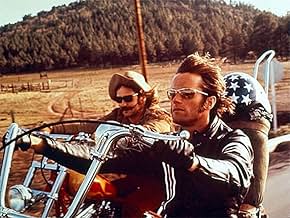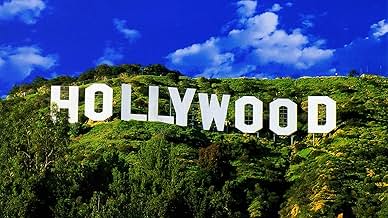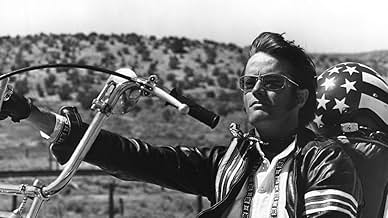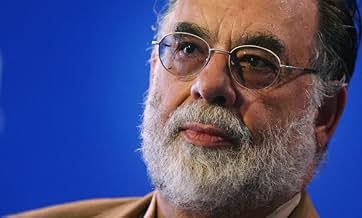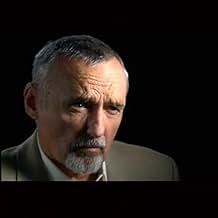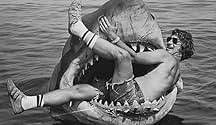Easy Riders, Raging Bulls: How the Sex, Drugs and Rock 'N' Roll Generation Saved Hollywood
CALIFICACIÓN DE IMDb
7.5/10
3.2 k
TU CALIFICACIÓN
Agrega una trama en tu idiomaA look at 1970s Hollywood when it was known as New Hollywood, and the director was the star of the movie.A look at 1970s Hollywood when it was known as New Hollywood, and the director was the star of the movie.A look at 1970s Hollywood when it was known as New Hollywood, and the director was the star of the movie.
- Dirección
- Guionistas
- Elenco
Sam Peckinpah
- Self
- (material de archivo)
- Dirección
- Guionistas
- Todo el elenco y el equipo
- Producción, taquilla y más en IMDbPro
Opiniones destacadas
I ran across the documentary by accident, and am really glad that I did - having been a slave to film study for the last 17 years of my life, I have read about, viewed documentaries involving, and seen the films of most of the filmmakers profiled in Easy Riders, Raging Bulls so I figured it would make for good background noise while I tended to some writing. What surprised me was that I had to postpone my work because I was literally riveted with this film.
Easy Riders, Raging Bulls chronicles the new wave of filmmakers who revolutionized Hollywood in the late 60's and 70's. While a lot of the stories are relatively well known (the foreign film influence, the problems with the filming of Jaws, the raising of the bar in terms of the box office gross) the candid commentary from the directors, producers, writers and actors that were involved was extremely enlightening and brutally honest. One story that sticks in my mind in particular is the telling by various people of the "Malibu Beach Group" that included Scorsese, Keitel, Spielberg and Paul Schrader among others gathering to party and discuss and debate film. Being a complete film geek, when friends and I get into philosophical discussions about where we would go if we could travel back in time to any moment, my answer has always been to be a production assistant on the set of Citizen Kane. After hearing this story in the documentary, transporting myself back to that scene is a close second. Supplementing these interviews were excellent behind-the-scenes footage that I had never seen of the filmmakers at work, which was absolutely fascinating.
While the documentary skips around according to genre, and not necessarily profiling a single filmmaker at a time, the range of directors presented is admirably wide. The obligatory (and famous) Coppola, Scorsese, Bogdanovch, Lucas and Spielberg are profiled with equal air time as directors who are not household names, like Sam Peckinpah, Arthur Penn and Hal Ashby. This is definitely a great documentary to catch if you want to get some ideas for films that you should watch but don't know are out there, as well as see some of the diverse portfolios the more "commercial" directors have in their pasts.
--Shelly
Easy Riders, Raging Bulls chronicles the new wave of filmmakers who revolutionized Hollywood in the late 60's and 70's. While a lot of the stories are relatively well known (the foreign film influence, the problems with the filming of Jaws, the raising of the bar in terms of the box office gross) the candid commentary from the directors, producers, writers and actors that were involved was extremely enlightening and brutally honest. One story that sticks in my mind in particular is the telling by various people of the "Malibu Beach Group" that included Scorsese, Keitel, Spielberg and Paul Schrader among others gathering to party and discuss and debate film. Being a complete film geek, when friends and I get into philosophical discussions about where we would go if we could travel back in time to any moment, my answer has always been to be a production assistant on the set of Citizen Kane. After hearing this story in the documentary, transporting myself back to that scene is a close second. Supplementing these interviews were excellent behind-the-scenes footage that I had never seen of the filmmakers at work, which was absolutely fascinating.
While the documentary skips around according to genre, and not necessarily profiling a single filmmaker at a time, the range of directors presented is admirably wide. The obligatory (and famous) Coppola, Scorsese, Bogdanovch, Lucas and Spielberg are profiled with equal air time as directors who are not household names, like Sam Peckinpah, Arthur Penn and Hal Ashby. This is definitely a great documentary to catch if you want to get some ideas for films that you should watch but don't know are out there, as well as see some of the diverse portfolios the more "commercial" directors have in their pasts.
--Shelly
The last golden age of Hollywood film-making is captured in this two hour documentary, based on Peter Biskind's bestselling book of the same name. Director Kenneth Bowser does a commendable job of corralling many of the key names of the period in this light but passable introduction to the topic.
Bowser's treatise of 1970s Hollywood is essentially a potted history of the time many of the key developments and vital films that were made during this period are passed over or given nothing more than a cursory glance. The documentary suffers as a result and added to this, historical inaccuracies are also evident.
Film fans will most enjoy the scenes of archival footage a desperately nerdy George Lucas being introduced as Francis Ford Coppola's 'assistant'; Jack Nicholson, Bob Rafelson, Dennis Hopper and Peter Tork on the set of The Monkees vehicle 'Head'; and the piece de resistance, a home movie with Messrs Spielberg, Lucas, Milius, Coppola, de Palma, Schrader and Scorsese all in the same room. To be a fly on the wall at that party!
There are also current interviews with the likes of Peter Bogdanovich, Dennis Hopper, Peter Bart, John Milius, Michael Phillips, Paul Schrader, Peter Fonda, Albert S. Ruddy and many more figures of the time.
Bowser's documentary serves as a snapshot of the time Biskind's novel is a veritable diary. The book is packed with amazing stories that even a 13-part series couldn't document. Watch this documentary, get a taste of the time and then buy the book to immerse yourself in a fantastic period of American filmic creativity.
Bowser's treatise of 1970s Hollywood is essentially a potted history of the time many of the key developments and vital films that were made during this period are passed over or given nothing more than a cursory glance. The documentary suffers as a result and added to this, historical inaccuracies are also evident.
Film fans will most enjoy the scenes of archival footage a desperately nerdy George Lucas being introduced as Francis Ford Coppola's 'assistant'; Jack Nicholson, Bob Rafelson, Dennis Hopper and Peter Tork on the set of The Monkees vehicle 'Head'; and the piece de resistance, a home movie with Messrs Spielberg, Lucas, Milius, Coppola, de Palma, Schrader and Scorsese all in the same room. To be a fly on the wall at that party!
There are also current interviews with the likes of Peter Bogdanovich, Dennis Hopper, Peter Bart, John Milius, Michael Phillips, Paul Schrader, Peter Fonda, Albert S. Ruddy and many more figures of the time.
Bowser's documentary serves as a snapshot of the time Biskind's novel is a veritable diary. The book is packed with amazing stories that even a 13-part series couldn't document. Watch this documentary, get a taste of the time and then buy the book to immerse yourself in a fantastic period of American filmic creativity.
The withering latter-end of 1960s cinema gave birth to a short-lived area of mainstream artistic vision - the 1970s was a decade wherein "the director was the star of the movie." I've never thought of it this way, but as the documentary points out, it's a valid and poignant summary of the time period.
This documentary - based on the best-selling book - offers an in-depth analysis of the film-making process of the 1970s... it starts out with "Easy Rider," from the late '60s, which became a huge box office success despite its profane content and extremely low budget.
The financial success of the movie seemed to spawn a new generation of artistic, low-budget films -- Scorsese and Coppola seemingly leading the revolution onwards.
Dennis Hopper would later fail with his semi-sequel to "The Last Picture Show" (as chronicled here) but other directors had success with their projects, attracting viewers despite the grungy themes of the films.
I've heard that cinema "died" in the 1970s, so far as that people had stopped going to see movies...without the influx of 1980s blockbusters, we might not have films today. I think that's rather a stretch.
If anything "Raging Bulls, Easy Riders" exaggerates the mild box office returns of the decade and tries to compensate for their low intake by citing critical praise for the films...all well and valid, when discussing the artistic merit...not financial gain.
I found this to be a rather enjoyable documentary, but I didn't learn anything I hadn't already known. It's got some good interviews, but they're not as insightful as they are amusing anecdotes.
If you are a film student, you could probably view a better and more in-depth summary of the decade; however, for novices, this is good starting ground.
This documentary - based on the best-selling book - offers an in-depth analysis of the film-making process of the 1970s... it starts out with "Easy Rider," from the late '60s, which became a huge box office success despite its profane content and extremely low budget.
The financial success of the movie seemed to spawn a new generation of artistic, low-budget films -- Scorsese and Coppola seemingly leading the revolution onwards.
Dennis Hopper would later fail with his semi-sequel to "The Last Picture Show" (as chronicled here) but other directors had success with their projects, attracting viewers despite the grungy themes of the films.
I've heard that cinema "died" in the 1970s, so far as that people had stopped going to see movies...without the influx of 1980s blockbusters, we might not have films today. I think that's rather a stretch.
If anything "Raging Bulls, Easy Riders" exaggerates the mild box office returns of the decade and tries to compensate for their low intake by citing critical praise for the films...all well and valid, when discussing the artistic merit...not financial gain.
I found this to be a rather enjoyable documentary, but I didn't learn anything I hadn't already known. It's got some good interviews, but they're not as insightful as they are amusing anecdotes.
If you are a film student, you could probably view a better and more in-depth summary of the decade; however, for novices, this is good starting ground.
Don't think the point of the book/movie was that the people mentioned have disappeared off the face of the earth -- just that they have never achieved the critical AND commerical heights they achieved in the '70's. Spielberg and Lucas have survived and flourished, but they never had any intentions of CHANGING Hollywood, their films basically fit within an established Hollywood tradition. They were squares, in other words.
This docu makes the misguided error of comparing the careers of Hal Ashby and Steven Spielberg. More different film-makers there have never been. However, by sheer virtue of sharing artistic or commercial success in Hollywood in the same decade, these two anomylous inclusions are lumped in together. Peter Bogdanovich regales us simpletons with his self-encyclopedia, as if he were ever more than a journey-man director. It's intriguing to see the commercial success of The Exorcist and the critical success of Mean Streets sharing the same five minute discussion with various Hollywood talking heads all of whom are past their prime.
One of the rare gems of the film is the sequence recalling how Martin Scorcese, Paul Schrader, George Lucas, Spielberg and many other prominent male film-makers would hang out in the same beach houses in Malibu, but it's only ten minutes long. This is a film obsessed with the tangential perks of that divine spark that was the 70's renaissance of American movies. Presumably this film is based on a best-selling book of the same name, but all this film can sum up is that a bunch of cool movies came out in the 70's, and that, YES, the men who made those movies hung out from time to time. Honestly, you'd be better off just watching every film by the directors that this film interviews and save yourself the thankless task of listening to too many Hollywood has-beens pine for yesteryear. What really happened to these people's careers? Drugs for some, ego for others. Spotty at best, this film just isn't all it could be. 3/10
One of the rare gems of the film is the sequence recalling how Martin Scorcese, Paul Schrader, George Lucas, Spielberg and many other prominent male film-makers would hang out in the same beach houses in Malibu, but it's only ten minutes long. This is a film obsessed with the tangential perks of that divine spark that was the 70's renaissance of American movies. Presumably this film is based on a best-selling book of the same name, but all this film can sum up is that a bunch of cool movies came out in the 70's, and that, YES, the men who made those movies hung out from time to time. Honestly, you'd be better off just watching every film by the directors that this film interviews and save yourself the thankless task of listening to too many Hollywood has-beens pine for yesteryear. What really happened to these people's careers? Drugs for some, ego for others. Spotty at best, this film just isn't all it could be. 3/10
¿Sabías que…?
- TriviaMany of the subjects profiled in author Peter Biskind's book, including directors Steven Spielberg, George Lucas, Robert Altman, and 'William Friedkin', declined interviews for the documentary.
- ConexionesFeatures Terror (1963)
Selecciones populares
Inicia sesión para calificar y agrega a la lista de videos para obtener recomendaciones personalizadas
Detalles
- Tiempo de ejecución1 hora 59 minutos
- Color
- Mezcla de sonido
- Relación de aspecto
- 1.78 : 1
Contribuir a esta página
Sugiere una edición o agrega el contenido que falta

Principales brechas de datos
What is the Spanish language plot outline for Easy Riders, Raging Bulls: How the Sex, Drugs and Rock 'N' Roll Generation Saved Hollywood (2003)?
Responda

